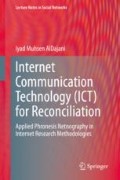Abstract
Having researched moderation in Palestine and Wasatia as a movement, the democracy described in the Wasatia cycle are more elaborated to evolve into deliberative democracy, the figure below serves to build up the theoretical foundations for the research design in researching Online Deliberative Democracy exploring its impact on social, cultural, economic, political transformation for a democratic society.
Access this chapter
Tax calculation will be finalised at checkout
Purchases are for personal use only
Notes
- 1.
Jurg Steiner is a professor emeritus in the department of political science at both the university of Bern and the University of North Carolina Chapel Hill.
- 2.
Jürgen Habermas is a German sociologist and philosopher in the tradition of critical theory and pragmatism. His most famous theories are on communicative rationality and the public sphere. One of his famous books are The Theory of communicative Action. 1981.
- 3.
James Bohman is Danforth Professor of Philosophy at Saint Louis University. He is the author, editor, or translator of many books.
- 4.
James S. Fishkin holds the Janet M. Peck Chair in International Communication in the Department of Communication at Stanford University where he is Professor of Communication and Professor of Political Science.
- 5.
Guanwei Hu, Wenwen Pan, Mingxin Lu, and Jie Wang, “The Widely Shared Definition of E-Government. An Exploratory Study,” The Electronic Library 27 (2009): 979.
Bibliography
Books
Bohman, J. (1998). The coming age of deliberative democracy. The Journal of Political Philosophy, 6(4), 400–425.
Bonnemann, T. (2009). What is deliberation? By TIMin DELIBERATION, DICTIONARY. [Online 4, March, 2009]. Accessed 10 May 2015. Available at www.intellitics.com/blog/2009/03/04/what-is-deliberation
Brantmeier, E. (2009). ICT for peace and reconciliation. In C. Vrasidas, M. Zembylas, & G. Glass (Eds.), ICT for education, development and social justice (pp. 213–236). Charlotte: Information Age Publishing.
Buchstein, H. (1997). Bytes that bite. The Internet and Deliberative Democracy, Constellations, 4(2), 248–263.
Cohen, J. (1998). Democracy and liberty. In J. Elster (Ed.), Deliberative democracy (Cambridge studies in the theory of democracy) (pp. 185–231). Cambridge: Cambridge University Press. https://doi.org/10.1017/CBO9781139175005.010.
Cronin, C. (2008). Between naturalism and religion by Jürgen Habermas. Cambridge: Polity. [German, 2005b].
Dryzek, J. (2002). Deliberative democracy and beyond: Liberals, critics, contestations. Oxford: Oxford University Press.
Edwards, R. (2002). The moderator as an emerging democratic intermediary. The Role of the Moderator in Internet Discussions about Public Issues, 7(1), 3–20.
Fishkin, J. (2009). When the people speak: Deliberative democracy and public consultation. Oxford: Oxford University Press. [Kindle Edition] Available at Amazon.
Fishkin, J., & Habermas, J. (1995). The voice of the people: Public opinion and democracy, deliberative politics. In Estlund (Ed.), Democracy, deliberative politics (p. 33, 114–115, 120–121). New Haven: Yale University Press.
Fishkin, J. S., & Luskin, R. C. (2006, January). Broadcasts of deliberative polls: Aspirations and effects. British Journal of Political Science, 36, 184–188.
Flew, T., & Young, G. (2005). From E-government to online deliberative democracy (pp. 1–11). Creative Industries Faculty: Queensland University of Technology, Brisbane, Australia, National Forum.
Gastil, J., & Levine, P. (2005). The deliberative democracy handbook: Strategies for effective civic engagement in the twenty-first century. New York: Wiley.
Gehrlein, W. (2006). Condorcet’s Paradox. Theory and Decision, 15(2), 29–35.
Gutmann, A., & Thompson, D. (2004). Why deliberative democracy? Princeton: Princeton University Press. [Kindle Edition] Available at Amazon.
Habermas, J. (1996). Contributions to a discourse theory of law and democracy. In addition, see his Discourse Ethics. In Moral consciousness and communicative action, translated by Lenhardt and Shier. In Between facts and norms (p. 94). Cambridge, MA: MIT Press.
Hu, G., Pan, W., Lu, M., & Wang, J. (2009). The widely shared definition of e-government. The Electronic Library, 27(6), 968–985.
Jankovic, I. (2012). Deliberative democracy: History of an idea. Theoria, Beograd, 55, 21–52.
Janssen, D., & Kies, R. (2005). Online forums and deliberative democracy. Acta Politica, 40(3), 317–355.
Johnson, D. (2000). Democratic values and the internet. In D. Langford (Ed.), Internet ethics (pp. 181–200). London: Macmillan.
Mančić, Z. (2012). Deliberative democracy and the internet: Whether online deliberative democracy can replace classical democracy? Philosophy and Society, XXIII(2), 168–186.
Murphy, C. (2010). A moral theory of political reconciliation. Cambridge: Cambridge University Press.
Pavličić, P. (2010). Condorcet paradox. Philosophy and Society, XXIII(2), 278–279.
Perera, M. (2015). Reconciliation in Sri Lanka: The role of ICT. [Online 30, June 2015]. Accessed 20 Jan 2016. Available at https://www.linkedin.com/pulse/reconciliation-sri-lanka-role-ict-mahesh-perera
Sandel, M. (2009). Justice: What’s the right thing to do. Oxford: Oxford University Press.
Selian, B. A. (2002). ICTs in support of human rights, democracy, and good governance. Geneva: International Union Telecommunication.
Sirianni, C., & Friedland, L. (2003). Civic innovation, conflict, and politics: Response for the good society symposium on civic innovation in America. The Good Society, 12(1), 74–82.
Steiner, J. (2012). The foundations of deliberative democracy: Empirical research and normative implications. Cambridge: Cambridge University Press.
van der Meer, T. G. L. A., Gelders, D. & Rotthier, S. (2014). e-Democracy: Exploring the current stage of e-Government. Journal of Information Policy, 4, 489.
Vrasidas, C., Zembylas, M., & Glass, G. (2009). ICT for education development and social justice. Charlotte: Information Age Publishing.
Wisegeek. (2018). www.wisegeek.com: What is an internet forume. Accessed 26 Apr 2018. Available at: http://www.wisegeek.org/what-is-an-internet-forum.htm
Author information
Authors and Affiliations
Rights and permissions
Copyright information
© 2020 The Editor(s) (if applicable) and The Author(s), under exclusive license to Springer Nature Switzerland AG
About this chapter
Cite this chapter
AlDajani, I.M. (2020). Internet Communication Technology (ICT) for Deliberative Democracy. In: Internet Communication Technology (ICT) for Reconciliation. Lecture Notes in Social Networks. Springer, Cham. https://doi.org/10.1007/978-3-030-41203-6_6
Download citation
DOI: https://doi.org/10.1007/978-3-030-41203-6_6
Published:
Publisher Name: Springer, Cham
Print ISBN: 978-3-030-41202-9
Online ISBN: 978-3-030-41203-6
eBook Packages: Physics and AstronomyPhysics and Astronomy (R0)

